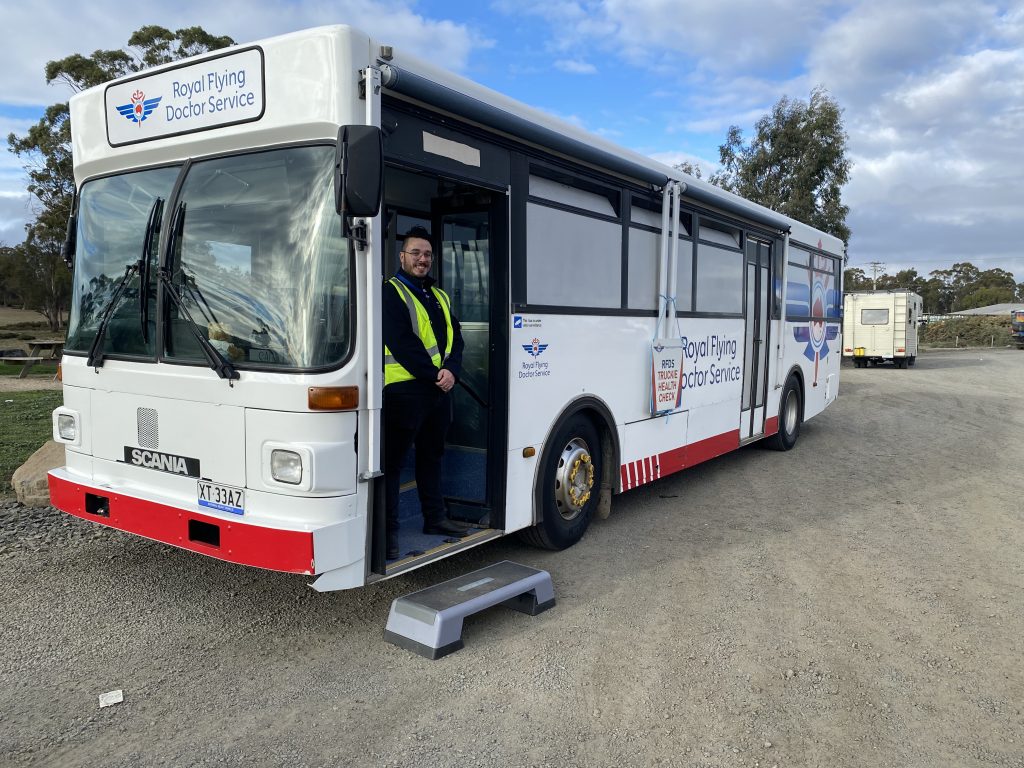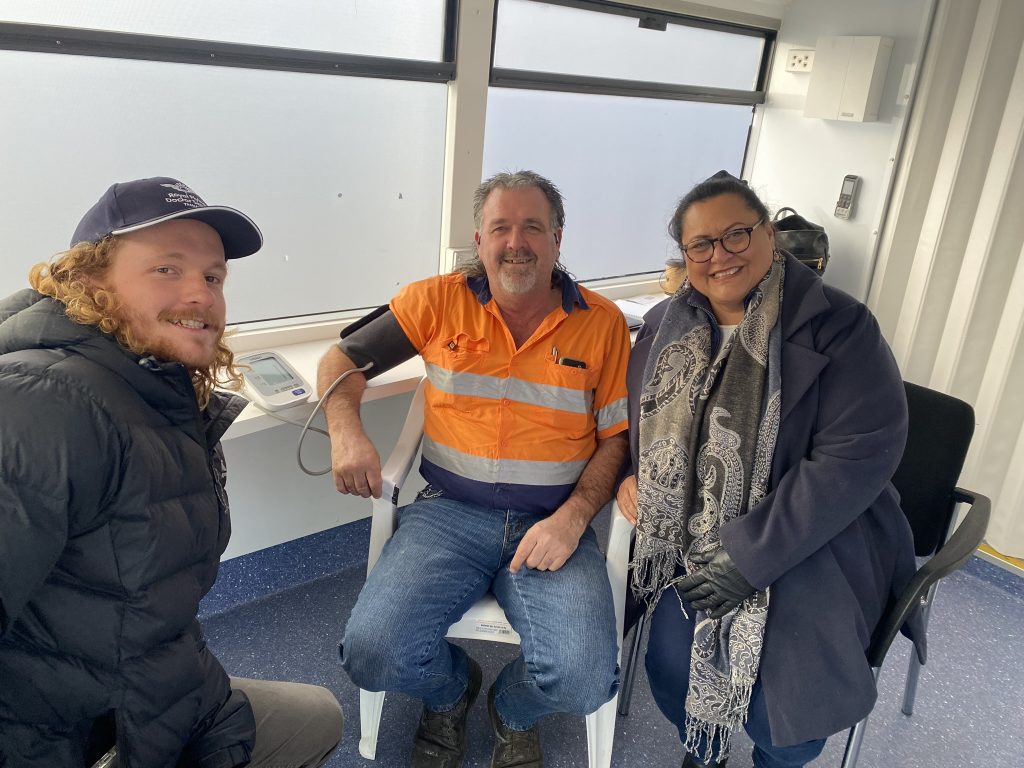Driving better health outcomes
Posted on December 19, 2024

How Tasmanian truck drivers have been/were supported to take their health care on the road
In a world that runs on convenience, it’s easy to forget about the people behind the wheel – keeping our shelves stocked and goods moving across the state and country.
Truck drivers play an important role in our everyday lives, but their health can often be overlooked.
Long hours on the road, limited access to nutritious food, and the isolating nature of the job can make it difficult for themruck drivers to prioritise their health.
That’s where the Royal Flying Doctor Service (RFDS) and its partners have stepped in, offering a unique service designed to bring preventive health care to truck stops across Tasmania.
The RFDS mobile Truckie Check-Ins, held in collaboration with the Tasmanian Transport Association and Rural Alive and Well (RAW), provide health checks for truck drivers – many of whom struggle to find time for regular medical appointments.
This initiative is part of the Open Road – Driver Health and Wellbeing Program, dedicated to improving the physical and mental health of Tasmania’s transport workers.
Truck drivers face a unique set of health risks. Long hours behind the wheel can contribute to a sedentary lifestyle, increasing the risk of chronic conditions such as heart disease, high blood pressure, and diabetes. Poor access to healthy food options and long periods of isolation only compounds these issues.
Smoking is another common concern among drivers, which further elevates the risk of cardiovascular and respiratory diseases.
Mental health is also a significant challenge, with many drivers experiencing loneliness, stress, and even trauma, having witnessed or been involved in road accidents leading to fatalities.
“Truck driving is tough,” says Rob Bayles, president of the Tasmanian Truck Owners and Operators Association.
“You’re sitting down for long periods, eating on the go, and constantly dealing with the pressure to meet deadlines. It’s not easy to look after your health in those conditions.”
Rob highlights the mental strain drivers face, noting the high incidence of road accidents and suicides witnessed by truck drivers, which can lead to hypervigilance.
“I’ve seen a lot of fatalities and suicides on the road,” he says.
“It’s estimated that around 15% of road fatalities are suicides. It’s tough knowing that could happen at any moment.
“You see someone do something stupid each time you go out on the road.”
Many drivers opened up about traumatic experiences, struggles with mental health, and the pressures of supporting family members as carers.
“Transport workers are especially vulnerable to mental health issues,” says Lauren Wynder, RFDS spokesperson.
“They spend long hours on the road, often with only their own thoughts for company. The isolation can be tough, and many have witnessed or experienced traumatic incidents on the road.”
With these challenges in mind, the RFDS and its partners are focusing on making health care more accessible to truck drivers by taking the services directly to them.
Together, they’ve created a service that seeks to meet the unique needs of truck drivers by offering care that’s accessible and tailored to their schedules.
The Truckie Check-Ins take place at various truck stops across Tasmania.
Throughout the year, the RFDS mobile health clinics have been set up at locations like Epping Forest, Kempton, and alongside the annual Truck Run, providing free health assessments.
The program has been well-received so far, with many drivers appreciating the convenience and personalised attention.
In 2024, health checks were provided to 27 drivers at Epping Forest in May and 30 drivers at Kempton in July. These check-ins included assessments of blood pressure, heart rate, and oxygen saturation levels. Several drivers were advised to follow up with their GP after presenting with concerning blood pressure levels.
Alongside the physical health checks, the mobile clinics offer smoking cessation support, mental health services, and advice from healthcare workers.
At the Kempton check-in, Christine Burt, an RFDS smoking cessation specialist, was available to speak with drivers interested in quitting smoking. While some drivers weren’t ready to discuss smoking cessation, the check-in provided an opportunity for open conversations about the long-term benefits of quitting.
For drivers like Rob, the initiative is a game-changer.
“It’s more than just getting your blood pressure checked,” he says.
“It’s knowing there’s a place you can stop, talk to someone, and be reminded to take care of yourself.
“It saves lives—if it gets one truckie to see a doctor, that’s a win.”
Rob, as a truckie himself, says he’s feeling hopeful for the future.
His goal is not only to offer preventive health care, but also to raise awareness of the importance of regular health checks—ensuring that drivers can keep Tasmania moving while staying healthy themselves.
“We’re aiming for the day when truckies see that bus and think, ‘I’ll stop and get my blood pressure checked again’. That’s when we’ll know we’ve made a difference.”

This story features in Issue 19 of our Primary Health Matters magazine. Click here to read the rest of the issue.
